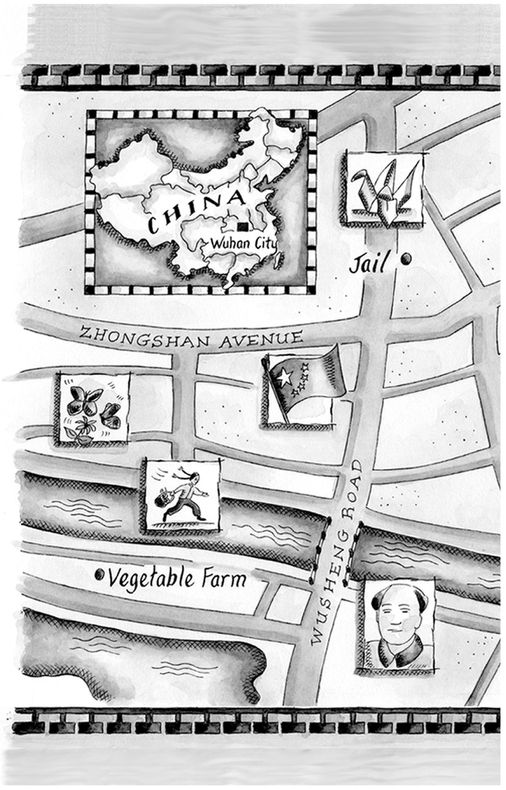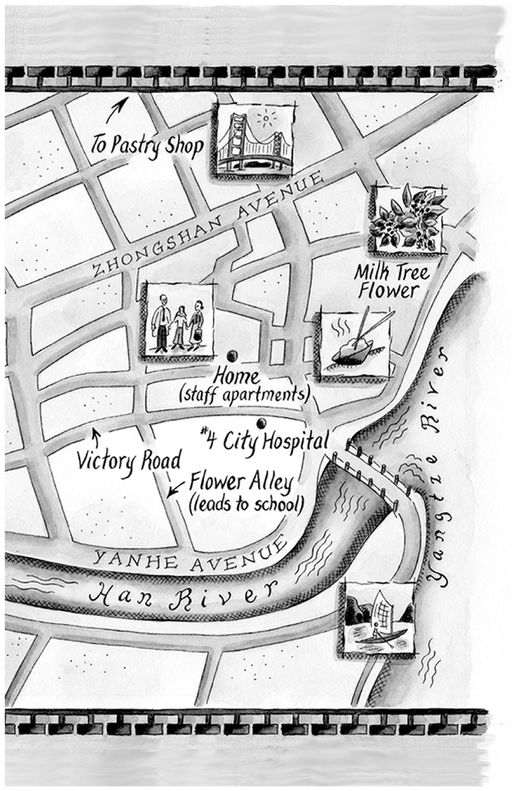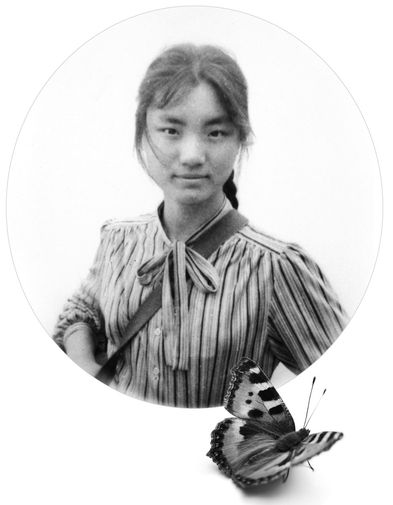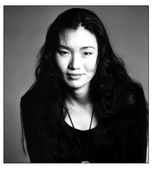Revolution Is Not a Dinner Party (14 page)
Read Revolution Is Not a Dinner Party Online
Authors: Ying Chang Compestine

Outside, the sun pushed through the dark clouds.
Mother stood next to us, smiling. “The new party secretary in the hospital decided your father has completed his re-education. He will be working as a doctor again.”
“I would have been home earlier.” Father wrapped his arms around us. “But the police wanted to make only one trip. I had to wait until they were ready to arrest Comrade Li and Comrade Sin. Oh, we can't call them Comrade anymore, can we?”
We laughed until our stomachs were sore, echoing the cheers in the courtyard. When I looked up, I saw my hidden hope through Mao's smiling face. I vowed that someday I would find my way to the Golden Gate Bridge.


Ying Chang Compestine

Although this is a work of fiction, many of the scenes and characters in the book are based on or inspired by real places, actual events, and people from my childhood.
I grew up in the compound of City Hospital Number 4 in Wuhan, where my parents worked. My father graduated from a medical school taught by American missionaries before the Communist Revolution. He was a well-known general surgeon. He taught me English and dancing, and together we listened to the BBC and took trips to a pastry shop.
During the Cultural Revolution, he openly disagreed with Mao and was accused of being an American spy and antirevolutionary. He was forced to work as a janitor in the hospital and later arrested and imprisoned in the city jail after refusing to collaborate with the officials to persecute one of his friends. Through those years, he treated antirevolutionary patients in secret and performed surgery on jail guards and Communist officials. On many occasions, I went to look for him when he was working late at the hospital, treating patients in his janitor's uniform.
After Mao's death, my father became the director of the surgical
department and the executive editor of the prestigious
Modern China Surgical Journal.
He came to the United States in 1990 with my mother, but missed his practice and patients and went back to Wuhan a year later. He worked at the hospital until he died on May 9, 1996, surrounded by his family, patients, friends, and colleagues.
department and the executive editor of the prestigious
Modern China Surgical Journal.
He came to the United States in 1990 with my mother, but missed his practice and patients and went back to Wuhan a year later. He worked at the hospital until he died on May 9, 1996, surrounded by his family, patients, friends, and colleagues.
My mother was a traditional Chinese medicine doctor. During the Cultural Revolution, she was forced to work the night shift as a nurse in the emergency room because she refused to draw a class line and divorce my father.
I have two brothers. Niu was inspired by one, as well as by a neighbor boy who lived upstairs. My brothers avoided being sent to the countryside for re-education, but were never allowed to attend high school and university. Both were factory workers for many years and still live in Wuhan with their families.
I started this book shortly after my parents passed away. It was then that I realized how much I miss Chinaâthe country I love so deeply.
The Communist Party took over China in 1949. The ensuing power struggle among the Communist leaders resulted in Mao Zedong launching the Cultural Revolution in 1966.
Chairman Mao wanted to destroy the culture of pre-Communist China and to regain power from his opponents. With the help of his wife, Jiang Qing, Mao organized the Red Guard, composed of middle school and high school students. Led by Mao's followers from the People's Liberation Army, the Red Guard imprisoned and murdered millions of intellectuals, opposition leaders, and anyone who spoke against Mao's ideology.
Mao's power reached its peak during the middle of the Cultural Revolution. During those years, everyone in China had to carry a little red book and wear Mao-style clothes and buttons bearing his portrait. Radio and loudspeakers broadcasted Mao's quotations and revolutionary songs. Every home and public building and space was decorated with Mao statues and quotations. China's economy reeled. Stores were empty and goods rationed.
Students were encouraged to rebel against teachers and inform on their politically incorrect seniorsâincluding their parentsâand
act as an ideological militia to ensure the victory of Mao's massive cleansing of his opponents.
act as an ideological militia to ensure the victory of Mao's massive cleansing of his opponents.
While the Cultural Revolution officially ended in 1969 and the worst abuses stopped, the politically charged atmosphere continued until Mao's death on September 9, 1976.
On October 6, less than a month later, the new chairman of the Chinese Communist Party, Hua Guofeng, ordered the arrest of Jiang Qing and her conspirators, the so-called Gang of Four. Jiang Qing was sentenced to death, later changed to life imprisonment. In 1991, she reportedly committed suicide in jail.
Today, China is still a Communist country, but perhaps in name only. Even though the government is a powerful dictatorship, in recent years it has instituted many free-market and capitalist-style reforms to the economy. This has led to joint ventures with foreign companies and an enormous increase in the standard of living for millions of people. Goods are no longer rationed; many are now imported from all over the world. After a long slumber, China is awakening and taking its place on the world stage.
1.
The title of this book comes from a passage in Chairman Mao's
Little Red Book
:
Why do you think the author chose to take the title from this passage?
The title of this book comes from a passage in Chairman Mao's
Little Red Book
:
“A revolution is not a dinner party, or writing an essay, or painting a picture, or doing embroidery; it cannot be so refined, so leisurely and gentle, so temperate, kind, courteous, restrained, and magnanimous.”
2.
Why do you think Chairman Mao was so easily able to turn neighbors against neighbors during the Cultural Revolution?
Why do you think Chairman Mao was so easily able to turn neighbors against neighbors during the Cultural Revolution?
3.
Ling's mother is able to sense early on that things in China are changing (on page 11, Ling notes that her mother has been in a bad mood for almost a year). What early indications does the author give that “danger [is] knocking on doors all over China”?
Ling's mother is able to sense early on that things in China are changing (on page 11, Ling notes that her mother has been in a bad mood for almost a year). What early indications does the author give that “danger [is] knocking on doors all over China”?
4.
Why does Ling's mother disapprove of so much of her behavior? Why do you think Mother seems to Ling “like a proud white rose,” which Ling is “afraid to touch because of [the] thorns”?
Why does Ling's mother disapprove of so much of her behavior? Why do you think Mother seems to Ling “like a proud white rose,” which Ling is “afraid to touch because of [the] thorns”?
5.
A propaganda film is a film produced (often by a government) to convince the viewer of a certain political point or influence the opinions or behavior of people.
Midnight Rooster
in this book is an example of such a film. What effect did watching this film have on the students at Ling's school? Why do you think Ling did not react to the film in the same way as her classmates?
A propaganda film is a film produced (often by a government) to convince the viewer of a certain political point or influence the opinions or behavior of people.
Midnight Rooster
in this book is an example of such a film. What effect did watching this film have on the students at Ling's school? Why do you think Ling did not react to the film in the same way as her classmates?
6.
What role does food play in the narrative of this book? Why do you think food is so central to the story?
What role does food play in the narrative of this book? Why do you think food is so central to the story?
7.
Ling's understanding of what bourgeois means changes throughout the book. Based on the events of the novel, what did the word mean during China's Cultural Revolution? Why was it bad for a family to be bourgeois?
Ling's understanding of what bourgeois means changes throughout the book. Based on the events of the novel, what did the word mean during China's Cultural Revolution? Why was it bad for a family to be bourgeois?
8.
Father chose to stay in Chinaârather than go to America with Dr. Smithâto help build a new China. The rally cry of Comrade Li's Red Guard is also for a new China. Why are the two groups (people like Ling's parents and devotees of Chairman Mao) not able to work together to build a new China?
Father chose to stay in Chinaârather than go to America with Dr. Smithâto help build a new China. The rally cry of Comrade Li's Red Guard is also for a new China. Why are the two groups (people like Ling's parents and devotees of Chairman Mao) not able to work together to build a new China?
9.
When Ling asks Mother why her family needs to hang so many portraits of Mao in their apartment, Mother explains, “It's like the incense we burn in the summer to keep the mosquitoes away.” What does she mean?
When Ling asks Mother why her family needs to hang so many portraits of Mao in their apartment, Mother explains, “It's like the incense we burn in the summer to keep the mosquitoes away.” What does she mean?
10.
What does the Golden Gate Bridge represent to Ling and her family?
What does the Golden Gate Bridge represent to Ling and her family?
11.
Mr. Ji, the antirevolutionary writer Ling and Father save, says “dark clouds have concealed the sun for too long” before he leaves their apartment. What does he mean?
Mr. Ji, the antirevolutionary writer Ling and Father save, says “dark clouds have concealed the sun for too long” before he leaves their apartment. What does he mean?
12.
What keeps Ling, Mother, and Father from losing hope like Mr. Ji and the baby doctor did?
What keeps Ling, Mother, and Father from losing hope like Mr. Ji and the baby doctor did?
13.
Why does Father operate on Comrade Sin?
Why does Father operate on Comrade Sin?
14.
Can you think of a time in America's history when the political atmosphere was like that during the Cultural Revolution in China? Why do you think people, no matter what country they live in, behave this way?
Can you think of a time in America's history when the political atmosphere was like that during the Cultural Revolution in China? Why do you think people, no matter what country they live in, behave this way?

For more information about Square Fish books, authors, and illustrators visit
Questions for the Author
YING CHANG COMPESTINE

Â
What did you want to be when you grew up?
At first an ice cream saleslady, and then a teacher.
Â
When did you realize you wanted to be a writer?
After I lost both of my parents to cancer, I realized how much I missed them and China. I found that writing keeps me close to them.
Â
What's your first childhood memory?
My first taste of imported chocolate, when I was five.
Â
What's your most embarrassing childhood memory?
When talking to a boy I had a crush on, I noticed that my toes stuck out of holes in my worn-out shoes.
Â
What's your favorite childhood memory?
Learning English from my father.
Â
As a young person, who did you look up to most?
Scarlett O'Hara from
Gone with the Wind
. I admired her strength and perseverance.
Gone with the Wind
. I admired her strength and perseverance.
Â
What was your worst subject in school?
The Revolutionary History of Communist China.
Â
What was your best subject in school?
Literature and writing.
Â
What was your first job?
Working as an interpreter for the Seismological Bureau of the Chinese Government.
Â
How did you celebrate publishing your first book?
I cooked a nice meal and invited friends over for a dinner party.
Â
Where do you write your books?
At home on my computer, by a window overlooking my beautiful garden.
Â
Where do you find inspiration for your writing?
Reading and traveling, cooking and eating.
Â
Which of your characters is most like you?
Ling in
Revolution Is Not a Dinner Party
, and Yun in “Tea Eggs” from
A Banquet for Hungry Ghosts.
Revolution Is Not a Dinner Party
, and Yun in “Tea Eggs” from
A Banquet for Hungry Ghosts.
Â
When you finish a book, who reads it first?
My family and two of my best friends.
Â
Are you a morning person or a night owl?
Night person for sure!
Â
What's your idea of the best meal ever?
One I cook for myself after a long trip.
Â
Which do you like better: cats or dogs?
Cats, maybe. Pets were not allowed when I was growing up and I am a little afraid of dogs.
Â
What do you value most in your friends?
Honesty, humor, and a positive attitude.
Â
Where do you go for peace and quiet?
Walking on the trail near my home.
Â
What makes you laugh out loud?
My son's jokes.
Â
What's your favorite song?
“Red River Valley.”
Â
Who is your favorite fictional character?
Scarlett O'Hara from
Gone with the Wind.
Gone with the Wind.
Â
What are you most afraid of?
Getting up early.
Â
What time of year do you like best?
Spring.
Â
What's your favorite TV show?
Kitchen Nightmares.
Â
If you were stranded on a desert island, who would you want for company?
My family and my close friends.
Â
If you could travel in time, where would you go?
To ancient Egypt. I would be an Egyptian queen like Cleopatra, but with a happy ending.
Â
What's the best advice you have ever received about writing?
Make every word count. Treat each one as if it was a precious pearl. Don't write a single note, but a symphony.
Â
What do you want readers to remember about your books?
The memorable characters, engaging plot, and surprise ending.
Â
What would you do if you ever stopped writing?
Play badminton at my club every day.
Â
What do you like best about yourself?
How I raised my son.
Â
What is your worst habit?
Checking my e-mail too often.
Â
What do you consider to be your greatest accomplishment?
Writing and publishing
Revolution
. It took me over six years to complete.
Revolution
. It took me over six years to complete.
Â
Where in the world do you feel most at home?
Wuhan, China.
Â
What do you wish you could do better?
Driving. I am working on overcoming my fear of driving on highways.
Â
What would your readers be most surprised to learn about you?
I have traveled all over the world, including the Antarctic.
Some weeks I spend over sixteen hours playing badminton at my club with people twenty years younger than me and still manage to beat them.
Other books
The Harder They Fall by Doreen Owens Malek
Casanova's Chinese Restaurant by Anthony Powell
Where Mercy Flows by Karen Harter
Hard Case Crime: House Dick by Hunt, E. Howard
In Sly's Eyes: In Sly's Eyes Marco's MMA Boys Book 2 by S.M. Donaldson
Charles the King by Evelyn Anthony
In Too Deep by Jennifer Banash
The Misbegotten (An Assassin's Blade Book 1) by Justin DePaoli
Get What You Give by Stephanie Perry Moore
The Election-Day Disaster by Ron Roy